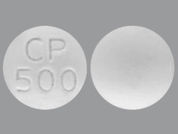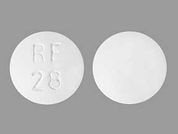Chloroquine Phosphate
Chloroquine Phosphate
What is Chloroquine Phosphate used for?
Chloroquine is used to prevent or treat malaria caused by mosquito bites. Chloroquine belongs to a class of drugs known as antimalarials. The United States Centers for Disease Control provide updated guidelines and travel recommendations for the prevention and treatment of malaria in different parts of the world. Discuss the most recent information with your doctor before traveling to areas where malaria occurs. Chloroquine is also used to treat infection caused by a different type of parasite (ameba). Chloroquine is not recommended for coronavirus infection, also known as COVID-19, unless you are enrolled in a study. Talk to your doctor about the risks and benefits.
CHEMICAL NAME
DRUG TYPE
MalariaChloroquine Phosphate Prices
Searching for the lowest prices
What does Chloroquine Phosphate look like?
View all Chloroquine Phosphate Image Information (7)Chloroquine Phosphate Frequently Asked Questions
This section contains uses of this drug that are not listed in the approved professional labeling for the drug but that may be prescribed by your health care professional. Use this drug for a condition that is listed in this section only if it has been so prescribed by your health care professional.
This drug may also be used for certain immune system diseases (such as lupus).
IMPORTANT: HOW TO USE THIS INFORMATION: This is a summary and does NOT have all possible information about this product. This information does not assure that this product is safe, effective, or appropriate for you. This information is not individual medical advice and does not substitute for the advice of your health care professional. Always ask your health care professional for complete information about this product and your specific health needs.



